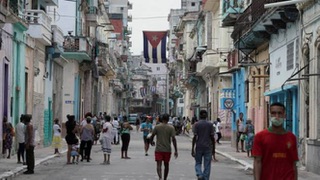
On May 20 I can’t understand why there are some Cubans and Latinos who escaped totalitarian governments and supported the GOP.
I reflect that the intertwining of politics, history, and identity is complex, especially for those who have experienced life under totalitarian regimes like Cuba. The significance of dates and the narratives surrounding them shape our collective memory and sense of belonging.
One of my frustrations is about the lack of recognition for May 20th as Cuban Independence Day. The erasure or distortion of historical events can lead to confusion and a loss of cultural heritage.
Moreover, the conflation of patriotism with particular political ideologies, as seen in the merging of homeland and revolution in Cuba, complicates matters further. True patriotism transcends political affiliations and encompasses a deeper connection to one's land, history, and people.
It's a testament to the resilience of individuals and communities that despite these challenges, efforts are made to reclaim and honor significant dates like May 20th. By preserving and sharing stories, memories, and traditions, the diaspora contributes to keeping alive the spirit of independence and the multifaceted identity of Cuba.
My reflections highlight the importance of remembering, acknowledging, and learning from history, not only to honor the past but also to navigate the complexities of the present and shape a better future.
Whether you were born in Cuba like me, or Nicaragua, Venezuela, or Chile the list continues, and they too left for a brave new world.
The history of any nation is a collection of told facts, and silenced facts, but must never be invented facts. This confusion borne from propaganda leads to difficulties and conspiracies.
Today is May 20, it is and has always been Cuban Independence Day, but the Castro regime has managed to alter this reality because there no longer is an Independence Day under Communism.
I was born in Cuba but I have never returned since my family left seeking a better way of life, just like so many others, so our memories are reconstructions based on old photos, films, and stories that must be told.
Many other dates have been declared holidays in Cuba, but none of them have national traditions to uphold, no typical dress is worn, no specific activities are carried out with children, and don't even mention food.
Both January 1st and July 26th are directly linked to the process led by Fidel Castro. Likewise, the government's narrative has always been that the triumph of 1959 was nothing more than a new chapter in the armed uprising of October 10th, 1868, so this historical day has also been associated with the current government.
In much of Latin America, the national day has to do with independence from the Spanish empire. This is the case in Colombia (July 20th), Venezuela (July 5th), and in Mexico (September 16th).
The day Cuba officially acquired independence was May 20th, 1902, the date on which the Cuban flag was first raised alone at Castillo del Morro.
In this way, Cuba became a Republic, a discredited one with terms like a pseudo-republic or neo-colonial republic, because the idea has been spread that it was not until Castro's arrival that the country acquired the character of a fully independent republic.
Therefore, May 20th passes each year on the island without much significance, not even recognized as a holiday, but a large part of the Cuban diaspora has tried to rescue it and give the date a new life.
That day has been described as “the most beautiful day Cuba has ever had”, when after thirty years of war and four years of American intervention, Cuba finally achieved its independence from Spain. It was a day of celebration, relief, and popular rejoicing.
However, time and time again, this day has been denied the recognition it will always deserve.
Unfortunately, in Cuba, the concepts of homeland and revolution have merged into a single notion. But homeland is not revolution, and a patriot is not a revolutionary, an anti-imperialist, and a socialist. These are distorted concepts.
Homeland is something else. It is much more than governments and political sympathies. Etymologically, the word in English results from the combination of home, land, and country, while in Romance languages like Spanish, French, and Italian, the equivalent word comes from the Latin patria, from the concept of “terra patria” (land of the fathers, ancestors).
This doesn't mean it's understood as the place of origin of the fathers; it's not about biological paternity but a social one, the homeland as a place of identification. And like myself, many others have to realize that it can’t happen here again.